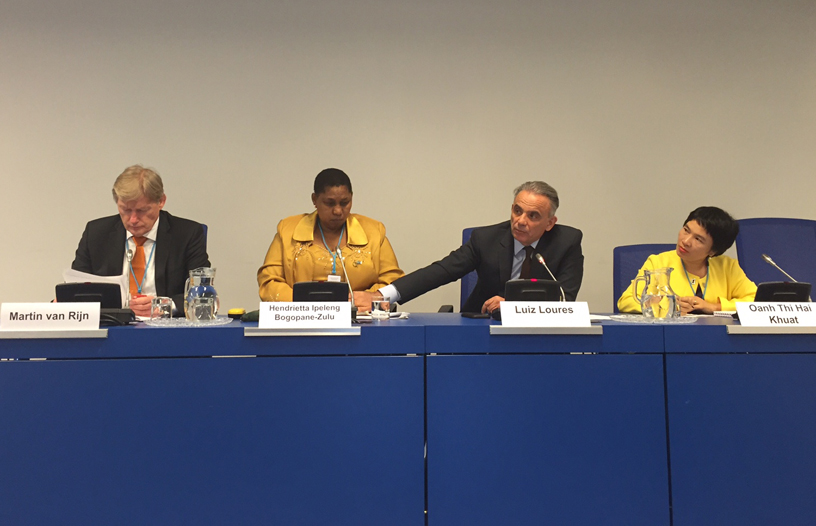Deputy Minister of Social Development indicates commitment to harm-reduction efforts for substance use despite troubles


This commitment comes at an increasingly turbulent time for South African – and indeed, African – drug policy.
With the forthcoming UN General Assembly Special Session on Drugs looming, the South African government nearly derailed the submission of a Common African Position by registering an entirely different document in the very last hour. Moreover, on the 9th of March, the country attempted to align itself with Russia by signing a declaration reflective of the “Russia-Africa Anti-Drug Dialogue”. The declaration, which is symbolic of Russia’s own attempts to garner support for a more punitive common position to be submitted to the Special Session, was thankfully postponed at the very last moment.
Here too, it was the Department of Social Development’s refusal to lend support to this position statement that ultimately led to it quietly being put back in the drawer. Such strong leadership from the DSD, while novel, finally comes at one of the most significant periods in drug legislation history, the point where emphasis stands to be placed on efforts aimed at the regulation of illegal substances that stretch far beyond simple law enforcement methods.
If such commitments can see reflection in the Department’s interface with citizens, it may be in a position to take the lead in redeveloping the legislative architecture which defines illegal substances, both in South Africa and beyond. With such reform, it is hoped, more effective, equitable, and just methods by which to regulate illegal substances and their use may become not only visible, but realizable.
The full text of the statement by Hendrietta Bogopane-Zulu, the Deputy Minister of Social Development is below.
- Simon Howell, Centre of Criminology, 17 March 2016
STATEMENT BY HON. HENDRIETTA BOGOPANE-ZULU, DEPUTY MINISTER OF SOCIAL DEVELOPMENT, SOUTH AFRICA, AND CHAIRPERSON OF THE FIRST AU SPECIALIZED TECHNICAL COMMITTEE ON HEALTH, POPULATION AND DRUG CONTROL TO THE COMMISSION ON NARCOTIC DRUGS (CND)
Your Excellency, Chairperson of the 59th Session of the CND,
Your Excellency, Ambassador Shamaa, Chairperson of the UNGASS Board,
Distinguished delegates Ladies and gentlemen,
We wish to commend you, Chairperson, on the manner you are conducting I am representing the African Union as elected Chairperson of the Bureau of the First AU Specialised Technical Committee on Health, Population and Drug Control, and former Chairperson of the 6th AU Conference of Ministers in Charge of Drug Control.
Chairperson, I can assure you that the policy organs of the AU have not only been active, but indeed proactive and forward looking in the area of drug control over the past 4 years, promoting a balanced and integrated approach to drug control. In 2012 the Conference of Ministers adopted the AU Plan of Action on Drug Control for the period 2013 to 2017, based on the 2009 UN Political Declaration and Plan of Action. The Ministers also adopted the African Common Position on Controlled Substances and Access to Pain Management Drugs, and both instruments were endorsed by the AU Executive Council in January 2013 and the heads of state in January respectively.
In accordance with its Plan of Action on Drug Control, which is due for review next year, the African Union emphasises evidence-based responses to drug control to its Member States in order to curb the health and social consequences that drugs cause. Respect for human rights in dealing with the issue of drugs, has been the departure point for the Ministers in Charge of Drug Control as well. For that reason, drug control is clustered alongside health and population matters in the AU Specialised Technical Committee, which also resonates with the African Union’s theme for this year, namely: 2016 the Year of Human Rights with particular reference to the rights of women.
Hence, in the Common African Position for the UNGASS, adopted by the STC Ministers of Health, Population and Drug Control in April 2015, the health approach to drug control is mentioned in six (6) of the ten (10) operative paragraphs. This Common Position reflects the AU Plan of Action, for instance its Output 2.4 in its Implementation Matrix, which requests Member States to have available, Comprehensive, accessible, evidence-informed, ethical and human rights based drug use prevention, dependence treatment and after care services.
Finally, I wish to underline the usefulness of a regional approach. In the case of the African Union, you can imagine that 54 countries are at different stages of developing their national drug strategies and legislation. You will also appreciate that Member States think differently about drugs. The advantage of the AU meetings is that the different approaches can be openly discussed. One Member State cannot prescribe to all the others. Most importantly, is that Member States wish to be seen to follow democratic approaches, to include those affected in decisions that concern them. I can attest to that strongly when it comes to the AU policy instruments on disability, for instance. In this regard, I would strongly support an approach where drug users form their own network to discuss their problems, that they have focal points in police stations and at hospitals with whom they can interact on their concerns and very importantly, that religious and traditional leaders be trained alongside criminal justice system professionals among others, on harm reduction approaches.
Your Excellencies, in conclusion then, the African Union wishes to see that the UNGASS Outcome Document contains a balanced and integrated approach to drug control pertaining to the roles of the criminal justice and health care systems; that human rights and the health approach be emphasised; that drug control approaches be harmonised and strengthened in different regions; and that the UNGASS have provisions that our people no longer need to die in pain or fear or helplessness.
In Conclusion, Member States should show their commitment by resourcing, establishing institutional, operational and legislative infrastructure, which will enable the implementation of a healthy, social, human rights and secure world.
I thank you.
